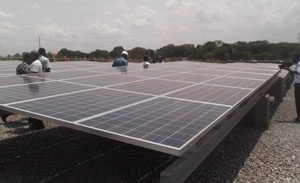In the wake of Ghana’s energy crisis, Japanese Ambassador to Ghana, Naoto Nikai has urged Ghanaian authorities to invest in solar energy.
At an event to inaugurate the first phase of the 315 kilowatt Solar Electricity Generation System at the Noguchi Memorial Institute for Medical Research (NMIMR) in Accra, Mr Nikai stated: “The utilization of renewable energy, such as solar power, is the future and the utilization of it will enable us to better sustain our planet and our lives.
And in Ghana, where the sun is bright and shines throughout the year, solar power is an appropriate option for renewable energy.” He said in 2010, the government of Japan extended a grant of 610 million yen, approximately $7.6 million, for the project aimed at introducing clean energy through solar electricity generation system for the Noguchi Institute.
Mr. Nikai expressed the hope that the project will contribute to Ghana’s efforts in promoting solar power. “I hope that the government of Ghana will fully utilize the system and ensure the provision of necessary resources to maintain it in good shape for years to come.” Professor Kwadwo Ansah Koram, Director, NMIMR, said the design and procurement processes were currently underway for the second phase of the project, which will increase the generation capacity by another 400KWh giving a total of 715KWh.
That, he said, will add on to the electricity power generation in the country, adding that the excess will be fed into grid to supply the rest of the university. Besides the immediate cost savings, he said additional benefits will accrue in terms of reduction in carbon emissions and less delirious impact on the environment.
Emmanuel Armah-Kofi Buah, Minister of Energy and Petroleum, said the first phase of the 315KW solar pack is unique because it is the first large scale project to be commissioned since the passage of the Renewable Energy Bill into Act (Act 823), which seeks to create the enabling environment for the development of renewable energy resources in Ghana.
Mr Buah said the project was a clear demonstration that solar energy could contribute to cost effective energy conservation and management, as well as reliability for non-residential consumers such as government institutions.
He expressed gratitude to the Government of Japan for its immense support to the energy sector in Ghana, stating that the approval by the Japanese Cabinet last month to support the power sector of Ghana with a grant amount of US$16 million was ample demonstration of the commitment of the Government of Japan to support the building of a robust energy economy in Ghana.
Professor Ernest Aryeetey, Vice Chancellor, University of Ghana, in a remark, said constant and reliable sources of energy would ensure that the institute carries out its mandate of conducting research into the major communicable and non-communicable diseases in Africa.
It would additionally provide training opportunities in medical research for undergraduate and postgraduate students in tertiary institutions. He said that the entire university community will benefit from the project because the 715KWh power to be generated will go into the national grid at the end of Phase II.
Business News of Thursday, 18 April 2013
Source: Daily Guide

















